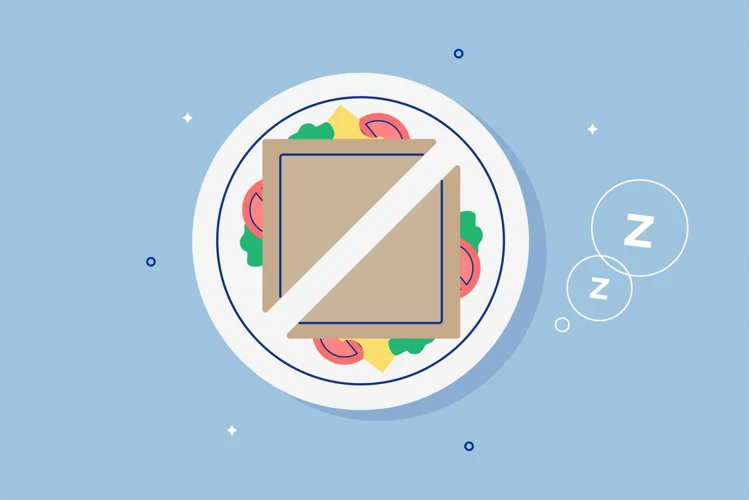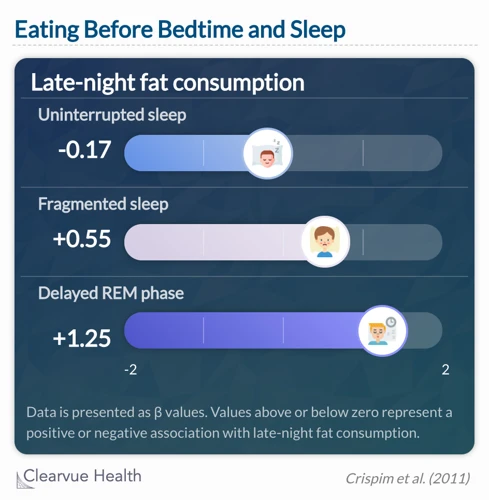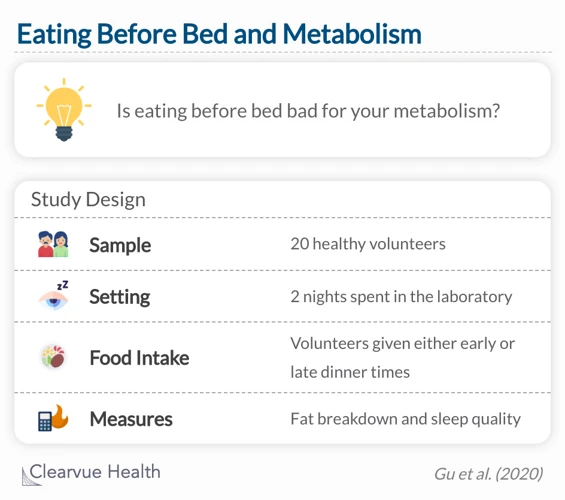Introduction

When it comes to achieving a peaceful and restful night’s sleep, many factors come into play. One of these factors that is often overlooked is the impact of late-night eating on sleep quality. While late-night snacking may be a common habit for some, research suggests that consuming food too close to bedtime can have a significant negative impact on the quality of sleep attained. In this article, we will explore the connection between sleep and eating habits and take a closer look at how late-night eating can affect your sleep quality. Additionally, we will provide tips for improving your sleep hygiene to ensure that you get the restful and rejuvenating sleep that you deserve.
Overview of Sleep and Eating Habits
Sleep and eating habits are two fundamental aspects of our daily lives that play a critical role in our physical and mental well-being. However, the relationship between these two activities is often overlooked.
On the one hand, sleep is a vital process that allows our body and mind to rest and recharge. During sleep, our body repairs damaged tissues, regenerates cells, and strengthens our immune system. On the other hand, eating, and more importantly, the timing and type of food we consume, can significantly impact our body’s ability to fall asleep and stay asleep throughout the night.
It is widely known that consuming large meals high in fat and sugar can lead to indigestion and discomfort, which can interfere with sleep quality. Additionally, consuming caffeinated drinks, such as coffee or tea, late in the day can keep us awake and alert for hours, making it difficult to wind down and fall asleep. Moreover, alcohol consumption before bedtime can contribute to fragmented sleep, leading to a feeling of exhaustion and sleepiness upon waking up.
In contrast, certain foods have been found to promote better sleep. For example, consuming foods rich in tryptophan, such as turkey, dairy products, and nuts, can increase serotonin levels in the brain, contributing to better sleep quality. Additionally, consuming complex carbohydrates, such as whole grains, vegetables, and fruits, can help stabilize blood sugar levels and promote a feeling of fullness and comfort, which can help promote deeper sleep.
Overall, it is essential to be mindful of our eating habits, particularly in the hours leading up to bedtime, as it can significantly impact our sleep quality and overall health. In the next section, we will explore the specific ways in which late-night eating can impact our sleep and what we can do to improve our sleep hygiene.
How Late Night Eating Affects Your Sleep Quality

Many people enjoy a late-night snack or meal before bed, but have you considered how it may be impacting your sleep quality? Research has shown that late-night eating can have negative effects on both digestion and metabolism, as well as hormones and blood sugar levels. Discomfort and acid reflux can also occur, leading to a restless night’s sleep. In this section, we’ll explore the various ways in which late-night eating can affect your sleep quality and ultimately, your overall health.
Delay in Digestion and Metabolism
When we eat, our body begins the process of digesting and metabolizing the food we consume. This process can take anywhere from a few hours to several hours, depending on the type and amount of food consumed. However, if we eat late at night, our body may not have enough time to fully digest and metabolize the food before we go to bed.
This can result in a delay in digestion and metabolism, which can negatively impact our sleep quality. This is because our body is still working to break down the food, which can cause discomfort and indigestion, and make it difficult to fall asleep. Additionally, if we eat high-fat or high-sugar foods late at night, our body may struggle to metabolize them effectively, which can lead to weight gain and other health issues over time.
One study found that participants who consumed a high-calorie meal right before bedtime experienced significant delays in their digestion and metabolism, which led to poorer sleep quality compared to those who ate earlier in the day. This highlights the importance of being mindful of our eating habits, especially in the evening hours when our body naturally begins to wind down and prepare for sleep.
To improve your sleep quality, it’s important to avoid eating heavy or high-fat meals late at night. Instead, opt for lighter, nutrient-rich meals that are easy to digest. Additionally, it’s a good idea to establish a regular sleep schedule and practice relaxation techniques, such as deep breathing or meditation, to help calm the mind and prepare the body for sleep.
Impact on Hormones and Blood Sugar
Late night eating can have a significant impact on hormones and blood sugar levels, which can in turn affect the quality of your sleep.
Hormonal Impact: When you eat late at night, your body may have difficulty producing the hormones that are necessary for sleep, such as melatonin. Melatonin is a hormone that is produced by the pineal gland in response to darkness and helps to regulate our sleep-wake cycle. Eating late at night can also disrupt the normal release of other hormones, such as cortisol, which can lead to increased stress and difficulty falling asleep.
Blood Sugar Impact: Late night eating can also cause a spike in blood sugar levels, especially if you consume foods that are high in carbohydrates or sugar. This can cause your body to produce insulin to regulate your blood sugar. However, insulin can also cause your body to produce serotonin, a neurotransmitter that can interfere with the body’s production of melatonin. This can result in difficulty falling asleep and staying asleep throughout the night.
Here is a table summarizing the hormonal and blood sugar impacts of late night eating on sleep quality:
| Impact | Description |
|---|---|
| Hormonal | Disrupts the production of sleep hormones like melatonin and cortisol. |
| Blood Sugar | Causes a spike in blood sugar levels, leading to increased insulin production and interference with the body’s production of melatonin. |
It’s important to be mindful of the hormonal and blood sugar impacts of late night eating on our sleep quality. In order to promote healthy and restful sleep, it may be helpful to avoid eating late at night or to choose lighter, healthier options if we do eat before bed.
Discomfort and Acid Reflux
Late-night eating can also lead to discomfort and acid reflux, which can negatively impact your quality of sleep. Indigestion and bloating caused by eating heavy or spicy foods can lead to discomfort and make it difficult to fall asleep. This discomfort can also wake you up during the night and disrupt your sleep cycle.
Consuming acidic foods and beverages close to bedtime can trigger acid reflux. Acid reflux, also known as gastroesophageal reflux disease (GERD), causes a burning sensation in the chest and throat and can also lead to difficulty falling asleep and staying asleep. Acid reflux can damage the lining of the esophagus and lead to more serious health problems.
To avoid discomfort and acid reflux, it is important to avoid consuming heavy or spicy meals late at night and to be mindful of what you are eating and drinking close to bedtime. Opt for lighter, low-acidic foods and beverages such as herbal tea or water. If you are prone to acid reflux, it may be best to avoid caffeine and alcohol as well. By making these small adjustments to your diet, you can improve your sleep quality and wake up feeling refreshed in the morning.
The Connection Between Sleep and Health

Good sleep quality is essential for maintaining good health, both physically and mentally. While sleeping, our bodies undergo critical processes that aid in repairing and rejuvenating cells, reducing inflammation, and regulating hormones. Poor sleep quality, on the other hand, increases the risk of developing several chronic illnesses, including diabetes, heart disease, and obesity.
According to a study by the National Sleep Foundation, adults need an average of 7-9 hours of sleep each night to maintain optimal health. Individuals who consistently sleep less than the recommended amount tend to have higher levels of stress hormones, increased inflammation, and a weakened immune system, all of which can negatively impact overall health.
Another significant aspect of sleep and health is the circadian rhythm, our body’s internal clock, which regulates the sleep-wake cycle. Late-night eating can disrupt this cycle, leading to a delay in the onset of sleep and lower sleep quality. Disrupting the circadian rhythm has also been linked to an increased risk of developing depressive symptoms, anxiety, and other mental health disorders.
Disrupted sleep can have adverse effects on appetite regulation, leading to a higher intake of energy-dense foods, particularly those high in fat and sugar. The resultant weight gain can further increase the risk of developing illnesses such as diabetes, cardiovascular disease, and certain cancers.
Sleep quality is crucial for maintaining good health, and late-night eating habits can significantly affect it. By establishing good sleep hygiene habits and following a healthy lifestyle routine, including avoiding late-night eating, individuals can significantly improve their overall health and well-being.
Tips for Improving Your Sleep Hygiene
As we have discussed earlier, late night eating habits can significantly impact the quality of your sleep. To ensure a good night’s rest, it is essential to practice good sleep hygiene. Here are some effective tips that can help improve your sleep hygiene, enabling you to sleep better and wake up refreshed. Let’s explore these tips in detail.
Avoid Eating Heavy Meals Late at Night
Late night eating can have a significant impact on the quality of your sleep. It is important to avoid eating heavy meals before bedtime to promote better sleep hygiene. Heavy meals late at night require more digestion and can disrupt your natural sleep cycle.
Why should you avoid eating heavy meals late at night?
When you eat a heavy meal late at night, your body has to work harder to digest the food. This can lead to discomfort and indigestion, making it more difficult to fall asleep. The digestive process can also stimulate the production of acid in the stomach, which can cause acid reflux and discomfort, further disrupting sleep.
The metabolic rate slows down when you sleep. This means that the calories from the late-night meal are not burned as efficiently as they would be during the day when your body is more active. This could potentially lead to weight gain, which is associated with poor sleep quality.
What can you do to avoid eating heavy meals late at night?
To promote better sleep hygiene, it is recommended to avoid eating heavy meals at least 2-3 hours before bedtime. This allows enough time for the digestive process to take place before laying down to sleep. Additionally, choose lighter meals that are more easily digested, such as vegetables, lean proteins, and whole grains.
Some other tips to avoid eating heavy meals late at night include:
| Tips for Avoiding Heavy Late Night Meals |
|---|
| Avoid processed and fatty foods that are difficult to digest |
| Eat a balanced dinner earlier in the evening |
| Make sure to not skip meals earlier in the day |
| Keep healthy snacks on hand if you feel hungry later in the evening |
Incorporating these tips into your daily routine can improve your sleep quality and overall health. By avoiding heavy meals late at night, you can give your body the time and energy it needs to properly digest food and promote restful sleep.
Establish a Regular Sleep Schedule
One of the best ways to improve your sleep quality is to establish a regular sleep schedule. This means going to bed at the same time every night and waking up at the same time every morning, even on weekends. This helps regulate your body’s internal clock and can improve the quality of your sleep.
To establish a regular sleep schedule, try the following tips:
- Set a consistent bedtime: Choose a time when you typically feel tired and aim to go to bed at that time every night.
- Avoid napping late in the day: If you need to nap, try to limit it to 20-30 minutes and avoid napping after 3pm.
- Wake up at the same time every day: Even if you had a restless night, try to wake up at the same time every morning. This will help regulate your body’s internal clock and improve the quality of your sleep over time.
- Avoid sleeping in on weekends: While it may be tempting to catch up on sleep on the weekends, it can disrupt your sleep schedule and make it harder to fall asleep Sunday night.
In addition to establishing a regular sleep schedule, there are other tips and tricks to improve your sleep hygiene and get a better night’s rest.
Practice Relaxation Techniques Before Bed
One effective way to improve your sleep hygiene is to practice relaxation techniques before bed. These techniques can help calm your mind and body, making it easier to fall asleep and stay asleep throughout the night.
Here are some relaxation techniques that you can try:
Progressive Muscle Relaxation: This technique involves tensing and then relaxing each muscle group in your body one at a time. Start with your feet and work your way up to your head, tensing each muscle group for a few seconds and then releasing the tension. This can help release physical tension and promote a sense of relaxation.
Deep Breathing: Deep breathing exercises can also help calm your mind and body before bed. Try inhaling deeply through your nose for a count of four, holding your breath for a count of seven, and exhaling slowly through your mouth for a count of eight. Repeat this exercise several times, focusing on your breath and letting go of any racing thoughts.
Mindfulness Meditation: Mindfulness meditation involves focusing your attention on the present moment and observing your thoughts and feelings without judgment. This can help reduce stress and promote a sense of calm before bed. To practice mindfulness meditation, find a quiet, comfortable spot and sit with your eyes closed. Focus on your breath and notice any thoughts or sensations that arise without getting caught up in them.
Yoga: Practicing yoga before bed can also help prepare your mind and body for sleep. Gentle yoga poses can help stretch your muscles and release tension, while also promoting relaxation and calm. Some good yoga poses to try before bed include child’s pose, forward fold, and legs-up-the-wall pose.
By incorporating these relaxation techniques into your nighttime routine, you can help improve your sleep quality and wake up feeling more rested and refreshed in the morning.
Conclusion
After analyzing the impact of late night eating on sleep quality, it is clear that there is a strong correlation between the two. Late night meals can disrupt the natural rhythm of the body, delay digestion and metabolism, and cause discomfort and acid reflux. These consequences can lead to poor quality of sleep and ultimately have negative effects on an individual’s overall health.
However, it is important to note that sleep quality is not solely affected by eating habits. Other factors such as stress, technology use before bed, and sleep disorders can also impact the quality of sleep. Therefore, it is crucial for individuals to take a holistic approach to improving their sleep hygiene.
By implementing simple lifestyle changes such as avoiding heavy meals late at night, establishing a regular sleep schedule, and practicing relaxation techniques before bed, individuals can significantly improve the quality of their sleep. Quality sleep, in turn, contributes to improved health outcomes and overall well-being.
In conclusion, while late night snacking might seem harmless, it can have a significant impact on sleep quality and ultimately, overall health. By taking proactive steps to improve sleep hygiene, individuals can improve their overall quality of life.
Frequently Asked Questions
What is the ideal time to have dinner to optimize sleep quality?
It is recommended to have dinner at least 2-3 hours before bedtime to allow for adequate digestion.
Does the type of food we eat before bed affect our sleep quality?
Yes, consuming heavy, greasy or spicy foods before bed can cause discomfort and acid reflux, negatively impacting sleep quality.
Is it true that drinking alcohol before bed can help induce sleep?
While alcohol can initially make you feel drowsy, it can disrupt your REM sleep and cause frequent wake-ups during the night, ultimately leading to poorer sleep quality overall.
How does late-night snacking affect our metabolism?
Consuming food late at night can slow down digestion and metabolism, leading to a higher likelihood of weight gain over time.
Can late night eating make it harder to wake up in the morning?
Yes, eating close to bedtime can lead to fragmented sleep and difficulty waking up in the morning, making it harder to feel well-rested and alert.
Does the amount of food we eat before bed affect our sleep quality?
Yes, consuming large amounts of food before bed can cause discomfort and disrupt sleep, leading to poorer sleep quality overall.
How can establishing a regular sleep schedule improve sleep quality?
Having a consistent sleep schedule helps regulate the body’s internal clock, making it easier to fall asleep and wake up at the same time each day, ultimately leading to better sleep quality.
Can meditation or deep breathing exercises help improve sleep quality?
Yes, practicing relaxation techniques such as meditation or deep breathing exercises can help reduce stress and quiet the mind, creating a more conducive environment for peaceful sleep.
Is there a relationship between poor sleep quality and certain health conditions?
Yes, poor sleep quality has been linked to a variety of health issues including obesity, diabetes, and cardiovascular disease.
Can improving sleep hygiene habits help improve overall health and well-being?
Yes, making small changes to improve sleep hygiene can have numerous benefits for overall health and well-being including improved cognitive function, better mood, and a stronger immune system.








